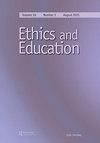Taking the moral authorship of children and youth seriously in times of the Anthropocene
IF 0.7
Q3 EDUCATION & EDUCATIONAL RESEARCH
引用次数: 3
Abstract
ABSTRACT In this article we argue for the need to take the moral voices of children and youth seriously particularly in times of the Anthropocene. Drawing on theories in ethics by John Wall, moral development according to Mark B. Tappan, and education in line with the works by Vygotsky, we construct a conceptual framework where the notions ‘narrative,’ ‘moral authorship’ and ‘free will’ can open new creative understandings of human ethical competence; a competence based in a relational, contextual and societal-cultural understanding of human existence. The use of our framework is illustrated in interpretations of empirical research with children demonstrating concerns of theirs in relation to climate change. The article concludes with reflections on the kind of education that can be inspired by this framework and the taking of children’s voices seriously, as well as pointing to challenges also to the grown-up world.在人类世时代认真对待儿童和青年的道德作者
摘要在这篇文章中,我们认为有必要认真对待儿童和青少年的道德声音,尤其是在人类世时代。借鉴约翰·沃尔的伦理学理论、马克·B·塔潘的道德发展理论和维果茨基的教育理论,我们构建了一个概念框架,在这个框架中,“叙事”、“道德作者”和“自由意志”等概念可以开启对人类道德能力的新的创造性理解;基于对人类存在的关系、语境和社会文化理解的能力。我们的框架的使用体现在对儿童的实证研究的解释中,这些儿童展示了他们对气候变化的担忧。文章最后对这一框架所能激发的教育类型进行了反思,并认真对待儿童的声音,同时指出了成人世界所面临的挑战。
本文章由计算机程序翻译,如有差异,请以英文原文为准。
求助全文
约1分钟内获得全文
求助全文

 求助内容:
求助内容: 应助结果提醒方式:
应助结果提醒方式:


